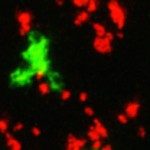Lien vers Pubmed [PMID] – 23183896
J. Immunol. 2012 Dec;189(12):5493-7
Monoclonal antibodies represent a promising approach to fight a variety of tumors, but their mode of action remains to be fully understood. NK cells can recognize Ab-coated targets, as well as stress ligands, on tumor cells. In this study, we investigated how NK cells integrate both kinds of activating signals. NK cell-mediated killing was maximal with the combined recognition of NKG2D ligands and Ab; surprisingly, only NKG2D engagement substantially enhanced degranulation. Conversely, Ab recognition by NK cells uniquely increased contact stability with tumor cells. Furthermore, using intravital imaging of solid tumors, we showed that Ab recognition favored prolonged interactions between NK cells and targets. Altogether, our results demonstrate that NK cell-mediated killing can be differentially regulated at the level of degranulation and contact stability by distinct activating receptors. Thus, complementary signals mediated by recognition of stress ligands and tumor-specific Abs may contribute to the efficacy of NK cells during mAb therapy.
